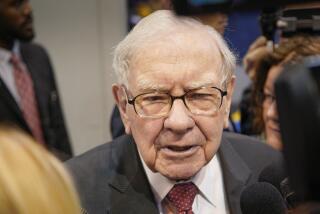Take a Chance and Be Charitable Despite It All
- Share via
With shrunken bank accounts and tanking investments, projections for charitable contributions this year are grim. Last year, private individuals contributed more than three-quarters of the more than $200 billion given to charities. On average, families making $100,000 or more gave away nearly $4,000 each. This year, people are worth less. They face an onslaught of solicitations. Their instincts tell them to tighten their belts and give less. They should resist that feeling.
Giving is never easy, even in good years. Each December, I seal my checks in their envelopes before I give myself time to think: What if my own situation changes and I’ll need that money? This year, faced with higher personal losses, people are less likely to contribute or to contribute at previous levels.
And yet, fortunately, not everyone will behave this way. Even faced with losses, some people want to be fair, so much so that they will not always act in their own self-interest. Several donors have told me that they want to give more, despite their losses.
That same capacity to see beyond one year’s bottom line may explain why some foundations faced with declining assets and gifts last year chose to give out more in grants than they had in the past. But that resolve to try to meet the need rather than preserve assets may be short-lived. More than three-quarters of all foundations included in a Chronicle of Philanthropy survey earlier this year intended to freeze their giving at last year’s level or give away less. Among them are foundations whose assets doubled or even tripled in the 1990s boom.
Many individuals, despite tremendous gains in personal wealth in recent years, will doubtless do the same. The largest income increases went to the top 20% of income earners. Since the 1970s, the top 1% of households doubled their share of national wealth.
Despite substantial losses, they are not among the millions of Americans currently faced with a loss of unemployment benefits, concerns about making their next month’s rent or what to do when their health insurance runs out.
The nation’s first great philanthropist, Andrew Carnegie, knew how to make money and how to give it away. The same man who advised that the way to become rich was to put all your eggs in one basket and then watch the basket also knew that the wealthy person who died rich died disgraced.
When I write my checks this year, I will try to bear in mind something written by Helen Keller. “Security,” she wrote, “is mostly a superstition.... Life is either a daring adventure, or it is nothing at all.” This year challenges those of us of means to embrace what we know: that our truest security lies in a compassionate future in which all people’s most basic needs are met every day.
More to Read
Sign up for Essential California
The most important California stories and recommendations in your inbox every morning.
You may occasionally receive promotional content from the Los Angeles Times.













